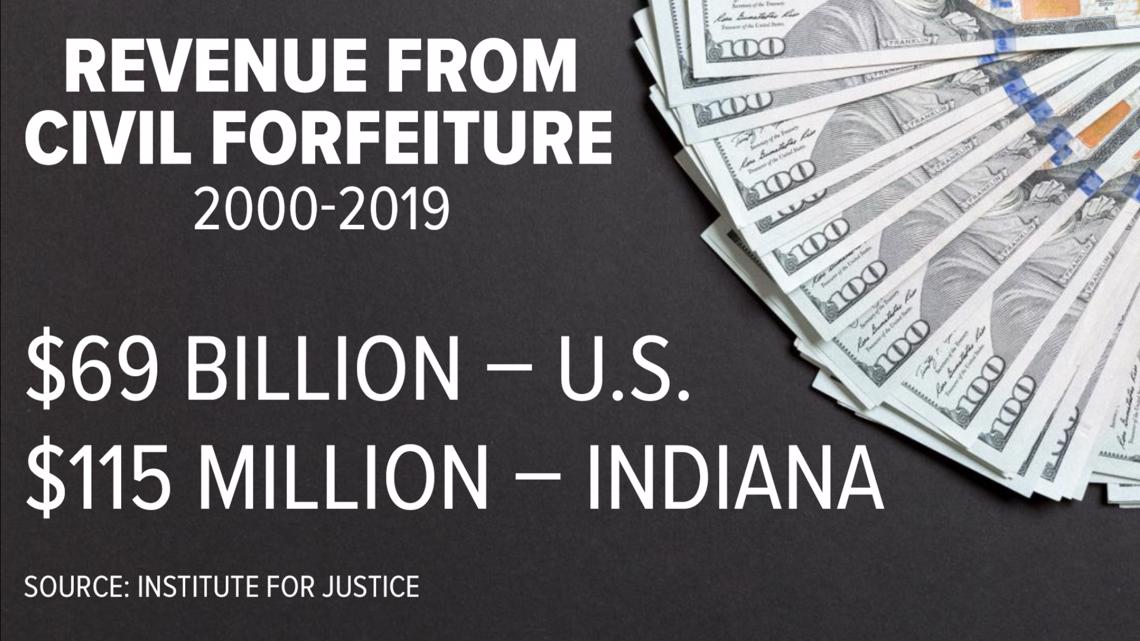GRANT COUNTY, Ind. — Tyson Timbs said he's paid for his mistakes. After nearly eight years of fighting, he just wants his SUV back.
Timbs, who lives in Grant County, has become the face of a national movement to do away with civil forfeiture. It's something his attorneys have called "the greatest threat to property rights in our nation."
To understand the debate, you have to go back in time.
"Our system is supposed to be about rehabilitation," Timbs told 13News during an interview in 2020. "That's not what any of this is."
Years earlier, in 2013, he pleaded guilty to heroin charges, served home detention, got probation and paid several hundred dollars in fines.
Police also took his $40,000 Land Rover, claiming Timbs had used it to traffic drugs.
"We already came to an agreement in court what I would do, with probation and all that," he said. "And then they throw this on."
Timbs had bought the Land Rover months before with proceeds from his father's life insurance policy.
"And if someone like me is supposed to be trying to rehabilitate myself and reintegrate myself into society, what sense does it make to make it harder?" he asked.
Civil asset forfeiture allows law enforcement to take someone's property if they believe it more than likely was connected to a crime. After the prosecutor or government-contract attorneys are reimbursed for the cost of working the case, police can keep much of the profit left over.
Between 2000 and 2019, the nonprofit Institute for Justice says $69 billion in revenue was reported from civil asset forfeiture actions. That includes about $115 million from Indiana.


Supporters of civil asset forfeiture call it an important crime-fighting tool to take a dent out of criminals' profits and their enterprises.
But Timbs' legal team said forcing Timbs to forfeit his Land Rover was excessive, given the crime.
They said he didn't have a prior record of drug use and has since beaten addiction and turned his life around.
"It doesn't help the people of this state for Tyson not to have a car. He's got obligations to go to probation meetings, get to work, he's got to go to substance abuse counseling," said Wesley Hottot during an interview in 2020. "All of those things are impossible in a place like Marion, Indiana, without a car."
In 2019, the case reached the U.S. Supreme Court, which ruled the Constitution's Excessive Fines clause doesn't just apply to the federal government, but states, too.
Months later, a Grant County judge ruled the forfeiture did amount to an excessive fine — and Timbs got his Land Rover back.
But the case is back in court again. The Indiana Attorney General appealed that lower court ruling, and the case is now before the state Supreme Court.
"Incredibly, the State of Indiana has devoted nearly a decade to trying to confiscate a vehicle from a low-income recovering addict. No one should have to spend eight years fighting the government just to get back their car," said Sam Gedge, Timbs' attorney.
A spokesperson for the State of Indiana responded with a statement:
The State of Indiana is appealing for two main reasons. First, prosecutors need greater clarity as to how the Indiana Supreme Court will apply the "grossly disproportionate" standard it set forth the last time it had the case before it. Second, if the Indiana Supreme Court decides that this forfeiture is "grossly disproportionate"—despite Tyson Timbs' use of the vehicle to deal heroin and to buy over $30,000 of heroin—the State will need to decide whether to ask the U.S. Supreme Court to weigh in, as such a result could impact forfeitures not only in Indiana but across the country.
Tonight at 11, 13News examines another aspect of civil asset forfeiture critics call a big problem. You don't have to be charged with a crime to lose your property. One Indiana couple became entangled in the process and lost both of their vehicles for nearly eight months. Hear from them and learn about reforms in Indiana to make sure it doesn't happen again.

